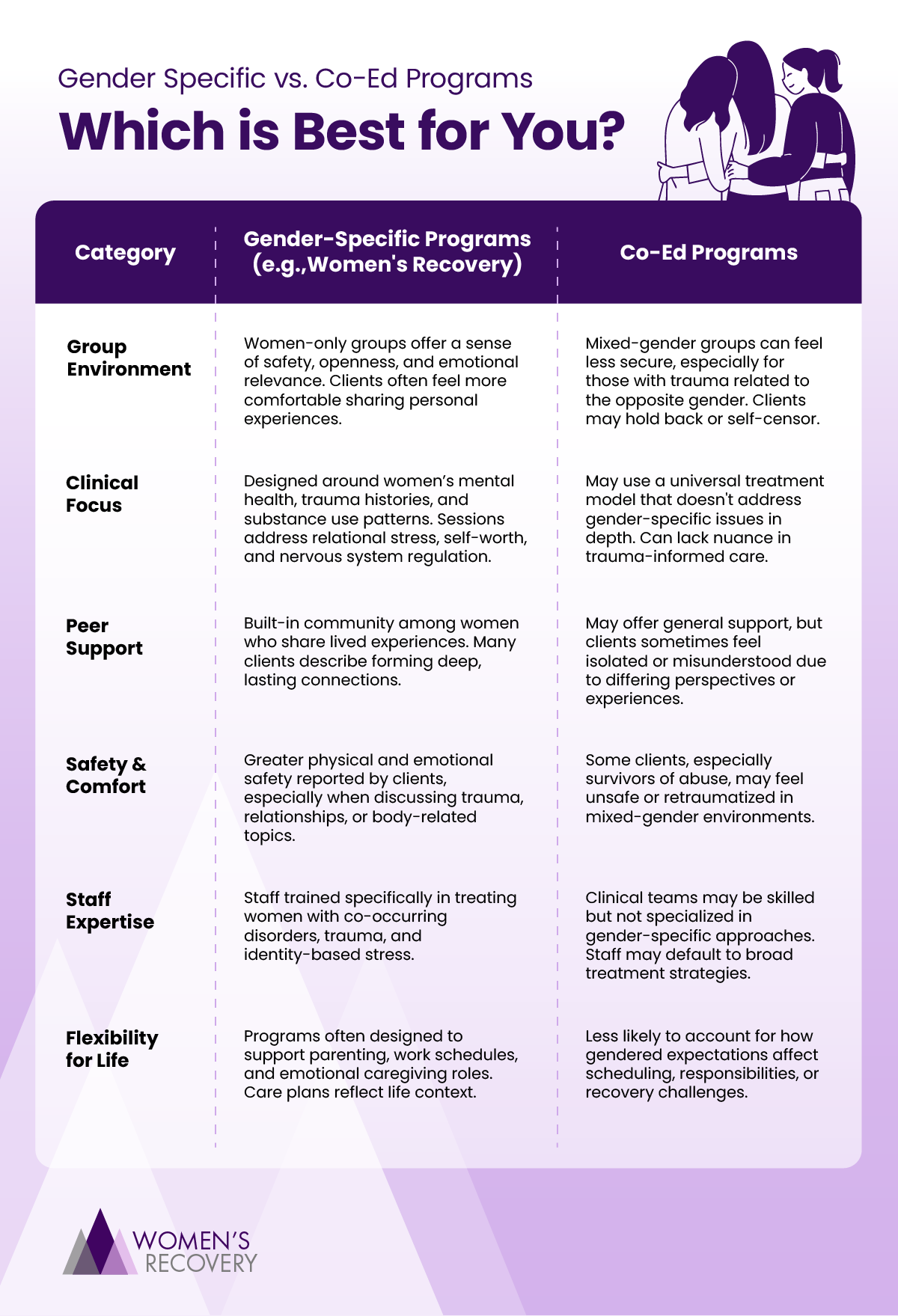Substance use doesn’t happen in isolation. It’s often connected to stress, trauma, identity, and the invisible weight people carry. For women, recovery can be complicated by expectations—how you’re supposed to show up in the world, what you’re supposed to handle, and how you’re expected to look while doing it.
That’s why gender-specific treatment can be so important. Programs designed specifically for women offer space to step out of survival mode, reflect without pressure, and focus on healing with support that makes sense for your life. Whether you’re seeking care for yourself or supporting someone you love, this kind of environment can shape the experience in meaningful ways.
At Women’s Recovery, we offer outpatient and partial hospitalization programs in Denver and Dillon, Colorado. We work with women who come from different backgrounds and bring different stories—but many of them are looking for the same thing: care that feels safe, supportive, and built around who they are, not who they’re expected to be.
Understanding Gender-Specific Treatment
Gender-specific addiction treatment is structured to meet the needs of women—emotionally, physically, and clinically. That includes everything from how groups are facilitated to which therapies are offered. It’s also about tone and culture. In a women’s program, you’re not managing how others perceive your story. You’re not measuring your words or filtering your reactions to make others more comfortable. You can talk about what actually happened. You can say things you’ve never said out loud before.
“One of the first things I noticed was how helpful it was to live among others that I could relate to and how supportive both the staff and my housemates were… DWR staff members helped me to feel loved and cared for.” – Amy
This kind of program doesn’t assume every woman’s experience looks the same. Gender-specific doesn’t mean one kind of story. It means a setting that recognizes how gender shapes our experiences and recovery needs.
Unique Challenges Women Face in Addiction
Women who seek treatment often describe a long delay between knowing something needed to change and being able to ask for help. That delay can be shaped by many things: caregiving roles, work pressure, fear of being seen as unstable, or past experiences of not being believed.
Some clients arrive having hidden their drinking from employers, partners, or children for years. Others feel ashamed for struggling despite outward success. Others are navigating anxiety, depression, trauma, or grief, and use substances to quiet thoughts or get through the day.
“I entered as an anxious, depressed, broken addict with no hope… I was scared to confront my addiction. Holly was so friendly and professional and I needed the immediate support and comfort she offered.” – Nicole
These experiences are different, but the emotional landscape often overlaps. And in a setting designed with those realities in mind, healing can begin without shame.
Advantages of Women-Only Programs
When care is structured around women, everything starts to feel a little different. You don’t have to explain the fear, the shame, or the silence. You don’t have to translate your experiences. And you don’t have to compartmentalize the parts of your life that don’t seem to “fit” in traditional recovery spaces.
Women-only programs offer:
- Space to speak freely about trauma, relationships, parenting, identity, and stress
- Group therapy that builds trust and connection
- Individual sessions that focus on both mental health and substance use
- Environments that feel stable, calm, and emotionally safe
“The small groups and one-on-one time with my counselor and case manager was exactly what I needed. I felt safe, loved, and most of all I felt like I mattered and belonged in this world.” – Cassie
When treatment reflects your reality, it’s easier to participate, connect, and move forward.
Success Stories from Colorado
Women’s Recovery supports women across the state—from Denver and Boulder to Summit County and beyond. Some clients have tried treatment before. Others arrive newly sober, unsure if they belong in a program at all. Many express relief after that first session, when they realize the space feels different.
“Today, with the help of everyone at DWR, I’m so happy to say that I have been sober for a year and I have gained more than I ever could have imagined… I’ve truly felt I was cared for every step of the way and the skills I’ve learned there will stay with me forever.” – Charlotte
Outcomes matter, but so does how someone feels while they’re in treatment. Safety and connection create the conditions for growth.
Choosing the Right Program for Your Loved One
If someone you care about is considering treatment, it’s helpful to look beyond basic features. Ask how the program is structured. Ask who leads the groups. Ask whether trauma, identity, and mental health are part of the conversation—or avoided.
When evaluating gender-specific programs, consider:
- Does the program address trauma and co-occurring mental health conditions?
- Is it outpatient-based, so clients can maintain work, school, or family connections?
- Is the staff experienced in addiction recovery for women?
- Are there referrals available for sober living or additional support?
Women’s Recovery provides:
- Trauma-informed outpatient and PHP care
- Nutrient therapy and neurofeedback
- Group and individual therapy
- Case management for housing, legal, and practical needs
- Sober living referrals for women needing more structure
The Women’s Recovery difference might change your life.
“I was greeted by smiling faces assuring me that I was in the right place making the right moves… I instantly felt hope and a desire to change.” – Nicole
Women’s Recovery Is Here to Help
When you’re ready to explore treatment—or even just think through what recovery could look like—we’re here. We don’t expect you to arrive with answers or readiness. You don’t have to be in crisis to reach out. You might just be tired. Or unsure. Or curious about what support could actually feel like.
You deserve care that sees all of you. We’ll help you find a starting point that feels possible.
To learn more about outpatient and PHP services in Denver and Dillon, contact Women’s Recovery today.








